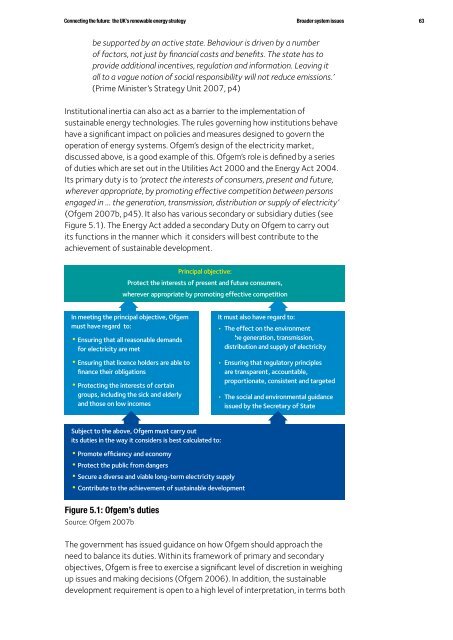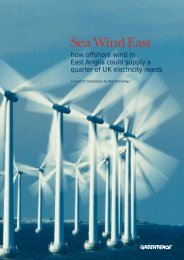Connecting the Future - Greenpeace UK
Connecting the Future - Greenpeace UK
Connecting the Future - Greenpeace UK
You also want an ePaper? Increase the reach of your titles
YUMPU automatically turns print PDFs into web optimized ePapers that Google loves.
<strong>Connecting</strong> <strong>the</strong> future: <strong>the</strong> <strong>UK</strong>’s renewable energy strategy<br />
Broader system issues<br />
63<br />
be supported by an active state. Behaviour is driven by a number<br />
of factors, not just by financial costs and benefits. The state has to<br />
provide additional incentives, regulation and information. Leaving it<br />
all to a vague notion of social responsibility will not reduce emissions.’<br />
(Prime Minister’s Strategy Unit 2007, p4)<br />
Institutional inertia can also act as a barrier to <strong>the</strong> implementation of<br />
sustainable energy technologies. The rules governing how institutions behave<br />
have a significant impact on policies and measures designed to govern <strong>the</strong><br />
operation of energy systems. Ofgem’s design of <strong>the</strong> electricity market,<br />
discussed above, is a good example of this. Ofgem’s role is defined by a series<br />
of duties which are set out in <strong>the</strong> Utilities Act 2000 and <strong>the</strong> Energy Act 2004.<br />
Its primary duty is to ‘protect <strong>the</strong> interests of consumers, present and future,<br />
wherever appropriate, by promoting effective competition between persons<br />
engaged in … <strong>the</strong> generation, transmission, distribution or supply of electricity’<br />
(Ofgem 2007b, p45). It also has various secondary or subsidiary duties (see<br />
Figure 5.1). The Energy Act added a secondary Duty on Ofgem to carry out<br />
its functions in <strong>the</strong> manner which it considers will best contribute to <strong>the</strong><br />
achievement of sustainable development.<br />
Principal objective:<br />
Protect <strong>the</strong> interests of present and future consumers,<br />
wherever appropriate by promoting effective competition<br />
In meeting <strong>the</strong> principal objective, Ofgem<br />
must have regard to:<br />
• Ensuring that all reasonable demands<br />
for electricity are met<br />
• Ensuring that licence holders are able to<br />
finance <strong>the</strong>ir obligations<br />
• Protecting <strong>the</strong> interests of certain<br />
groups, including <strong>the</strong> sick and elderly<br />
and those on low incomes<br />
It must also have regard to:<br />
• The effect on <strong>the</strong> environment<br />
of <strong>the</strong> generation, transmission,<br />
distribution and supply of electricity<br />
• Ensuring that regulatory principles<br />
are transparent, accountable,<br />
proportionate, consistent and targeted<br />
• The social and environmental guidance<br />
issued by <strong>the</strong> Secretary of State<br />
Subject to <strong>the</strong> above, Ofgem must carry out<br />
its duties in <strong>the</strong> way it considers is best calculated to:<br />
• Promote efficiency and economy<br />
• Protect <strong>the</strong> public from dangers<br />
• Secure a diverse and viable long-term electricity supply<br />
• Contribute to <strong>the</strong> achievement of sustainable development<br />
Figure 5.1: Ofgem’s duties<br />
Source: Ofgem 2007b<br />
The government has issued guidance on how Ofgem should approach <strong>the</strong><br />
need to balance its duties. Within its framework of primary and secondary<br />
objectives, Ofgem is free to exercise a significant level of discretion in weighing<br />
up issues and making decisions (Ofgem 2006). In addition, <strong>the</strong> sustainable<br />
development requirement is open to a high level of interpretation, in terms both




![[2007] EWHC 311 - Greenpeace UK](https://img.yumpu.com/22079793/1/184x260/2007-ewhc-311-greenpeace-uk.jpg?quality=85)











